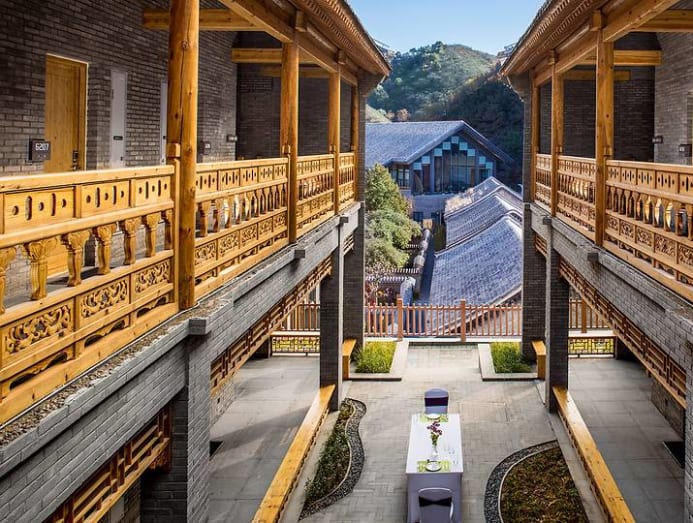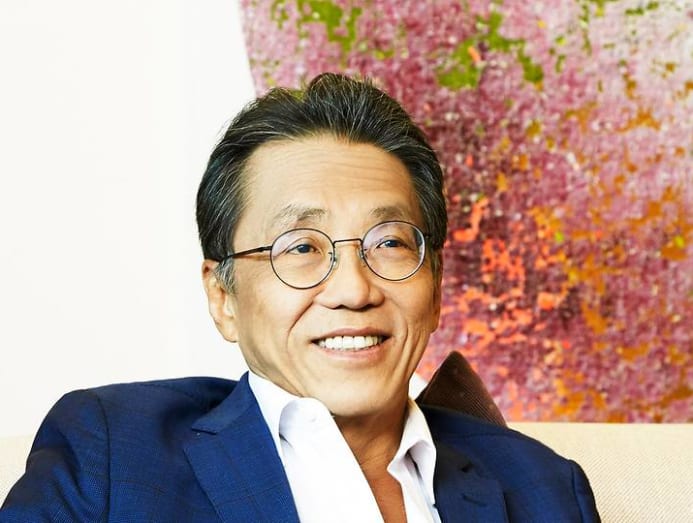Banyan Tree's Ho Kwon Ping on Asian pride and venturing into 'budget' travel
Ho Kwon Ping is easily ane of Singapore's nigh recognisable entrepreneurs, the face of an award-winning hospitality empire that comprises 49 hotels and resorts, 64 spas, 76 retail galleries, and three golf courses in 23 countries.
Late last year, the group announced the development of 26 new hotels. This figure has since jumped to 34 at last count. "It's changing every mean solar day," remarked Ho, speaking to CNA Luxury on the occasion of Banyan Tree's 25th ceremony.
This sudden growth spurt, he elaborated, can be attributed to two main factors. The kickoff was the determination to be a "multi-branded hotel management company" and grow the company beyond the Banyan Tree brand.
The second: The nail in Asian tourism – specially Chinese tourism – in recent years.
THE 'AIRASIA PHENOMENON'

"We've also seen tourism in Southeast Asia – Vietnam, Cambodia, Laos, the Philippines and Indonesia – accept off due to the ascension of the younger centre grade," Ho observed.
"I like to call information technology the 'AirAsia Miracle'," he says, describing a breed of consumers known to pair high street mode with designer brands – and wing budget.
"They may wear Zara [clothes] and bear a Chanel bag and they would only go to Starbucks for their coffee. And they would fly AirAsia but eat at Michelin-starred restaurants," he explained.
"So, while they may desire to salve their coin for other things, they however desire to stay somewhere that's blueprint-focused. I think there's room for growth in that segment in Asia, and now we have brands that fit that very well," he said, referring to Cassia and Dhawa.
The two brands debuted in 2015 and 2016 respectively. With creativity and fun at the middle of their value propositions, they targeted younger, pattern-savvy travellers.
READ> 6 hotspots to check out in Milan, Italy's design and fashion capital
NEW (DEMOCRATIC) BRANDS COMING INTO BLOOM
Ho's ambitions to bookend the hospitality market place is gear up to abound with the planting of three new brands – which will non be named later trees.
"Naming the showtime brand Banyan Tree was accidental," said Ho. "Then, we wanted to go on it alphabetical and then nosotros came upward with Angsana for the next one and they're all symbolic."
Angsana, for example, evokes a sense of chance with its slogan 'Sensing the moment', because the flowers of the angsana tree bloom unexpectedly.
"So we have A, B, C and D, and soon nosotros will have E, F and M. And I'm running out of names of trees to name them," he joked.
Intended to cater to specific segments of the hotel manufacture, the three new brands will besides help facilitate more seamless collaboration with property developers looking for a complete portfolio of hospitality products at various toll points.
"We've institute that in that location are a few more than positions in the marketplace nosotros haven't filled withal," noted Ho.
While he can't disclose details at this stage, Ho does hint that the new brands will tilt towards the economical (read: budget) end of the scale.
"They may not exist the most expensive but they volition still be pattern-oriented, best in class, and focus on memorable guest experiences. Those are the common themes that link all our brands together," he shared.
How is he going achieve this with a upkeep hotel, though?
"That'southward the very interesting challenge we take. It's fun to practice luxury but doing something actually design-focused which has to be inexpensive? The statement is that yous can do that but it's not like shooting fish in a barrel," he said.
THE RISE OF 'RAINBOW TOURISM' AND ASIAN PRIDE
The futurity of tourism and hospitality, Ho believes, is going to wait a lot like a rainbow – meaning more multifariousness.
"In the past, it has always been 'white' tourism, flowing in one direction," he noted. "But now, nosotros're seeing an explosion of 'rainbow tourism' – you lot've got yellowish, pink, black and chocolate-brown – because of the change in geographical wealth. And this is happening not just in terms of guests only human talent, too."
While he is quick to signal out that he is not anti-Western, the collection of brands nether the Banyan Tree umbrella is a source of Asian pride for Ho.
"As an Asian who wants to see our younger talent exist able to compete with the all-time in the Westward, I'm proud to see our Asian talent grow. I run across this as a trend that's going to intensify and I want to be riding that wave when information technology really goes all across the world," said Ho, who'due south also founding chairman of the Singapore Management University, a role he accustomed to help nurture Asian talent.
READ> All about access: Small grouping tours are the adjacent large affair in luxury travel
ON SUCCESS, REGRETS AND LESSONS IN RESILIENCE

If yous had asked Ho what his definition of success was when he first started Banyan Tree a quarter century agone, it would have been avoiding going bankrupt within the year.
Today, he defines success equally "a sense of relief at not screwing up so badly".
"For an entrepreneur to survive 25 years in a pretty difficult global surround is not easy. So, there's a relief and gratitude that nosotros are thriving and standing to grow," he qualified.
And if at that place's one thing he'southward learnt in this time, it's the importance of resilience.
"The tourism business, specially luxury tourism, is 1 the virtually volatile businesses. Upshot risk can destroy everything chop-chop. In times of state of war, epidemics and tsunamis, who needs a holiday? Who needs a holiday home?" he asked rhetorically.
The auction of holiday homes, he says, makes up about 50 per cent of the group'south overall revenue.
On the topic of regret, he has just ane: "It's that fifty hotels in 25 years is very tiresome progress. Information technology should've been faster. But having reached critical mass now, growth is really picking upwards."
Viewing the 25th anniversary milestone every bit an opportunity to reverberate, Ho said: "There were a lot of mistakes we've fabricated just we've survived a huge number of crises and we've built a community of thousands of people who are really proud of what they practice, and the make is getting traction everywhere. Plus, we've had fun along the style."
He is likewise proud of the fact that the family business is still independent, untouched by the consolidation in the global hospitality sector that has seen many hotel names and bondage swallowed up past larger groups.
The company has struck 2 strategic partnerships to fuel further expansion, though: A co-development bargain with French multinational hospitality company AccorHotels, also as a joint venture with Vanke, one of the largest property developers in China. Both have taken a v per cent pale in Ho'due south company.
LEAVING A LEGACY

Equally he approaches his 67th year this August, the thought of leaving a legacy does make Ho cringe a lilliputian.
"Legacy is non about people remembering you; who gives a damn how people remember you when you're dead already anyhow? If you want people to think well of you, do it while you're alive," he offered candidly.
"So, to me, legacy is most whether you've given what you've congenital a solid foundation to abound beyond your wildest dreams."
To this end, Ho's succession plan is already in motion. He has been consciously decentralising determination-making and implementing structures and mechanisms for the business concern to continue running independently of his interest in future.
And on this 25th year since Banyan Tree first put downward roots, he believes he's "25 per cent of the style there" to achieving that cocky-defined legacy.
READ> How meditation and mindfulness can make your vacations more than enjoyable
Source: https://cnalifestyle.channelnewsasia.com/people/banyan-tree-25-th-anniversary-ho-kwon-ping-239341
0 Response to "Banyan Tree's Ho Kwon Ping on Asian pride and venturing into 'budget' travel"
Enviar um comentário